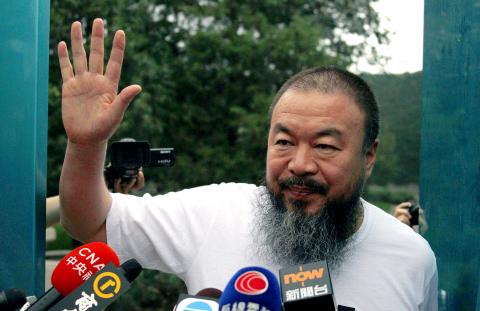Artist Ai Weiwei (艾未未), the most high-profile target of a sweeping crackdown on activists in China, has returned home after nearly three months in detention. Looking tired and thinner, he said the conditions of his release meant he could not talk more.
Xinhua news agency said Ai confessed to tax evasion, accusations his family had long denied and which activists had denounced as a pretense for detaining him. He has spoken out strongly against the Chinese Communist Party, and his family and supporters say he was being punished for speaking out about the leadership and social problems.
Ai, who was taken away on April 3, walked through the gate of his suburban home studio late on Wednesday with his mother and wife. He said his health was fine and thanked reporters outside his studio for their support, but said he could not speak further.

Photo: Reuters
“I’m sorry I can’t [talk], I am on probation, please understand,” Ai said, speaking in English.
His detention sparked an international outcry, with the US and other countries saying it was a sign of China’s deteriorating human rights situation.
That international condemnation, along with Ai’s party connections as the son of one of China’s most famous modern poets, had convinced authorities to strike a deal with Ai on his release, said Jerome Cohen, a top expert on Chinese law at New York University.
He said Ai was most likely released on a form of bail that restricts suspects’ movements to their home city for one year. However, authorities can reopen the case at any time, meaning Ai faces the ever-present threat of being detained again on the same accusations.
Human rights groups and Western officials yesterday welcomed the release, but voiced dismay about the conditions and urged Beijing to free other activists.
Calling his release a “relief for his family, friends and supporters,” Human Rights Watch (HRW) nevertheless said that “troubling unanswered questions about his arrest, detention and conditions of release” remain.
The New York-based group said it was “concerned about the political nature of his arrest, the conditions under which the police may have extracted a ‘confession’ from him and possible restrictions on freedoms he faces.”
It also called for the release of other activists who have disappeared into police detention since mid-February when Beijing — nervous about online calls for protests echoing those in the Arab world — clamped down on dissent.
Amnesty International also hit out at Beijing, saying Ai’s long detention without charge “violated China’s own legal process,” and it urged the world to push for the release of other dissidents.
Meanwhile, in Taipei, President Ma Ying-jeou (馬英九) yesterday called for the release of more dissidents detained by the Chinese government.
Presidential Office spokesman Fan Chiang Tai-chi (范姜泰基) said Ma applauded Beijing’s move to release Ai, but expressed concerns about other dissidents, including Nobel laureate Liu Xiaobo (劉曉波), who are still in detention.
ADDITIONAL REPORTING BY MO YAN-CHIH

BUILDUP: US General Dan Caine said Chinese military maneuvers are not routine exercises, but instead are ‘rehearsals for a forced unification’ with Taiwan China poses an increasingly aggressive threat to the US and deterring Beijing is the Pentagon’s top regional priority amid its rapid military buildup and invasion drills near Taiwan, US Secretary of Defense Pete Hegseth said on Tuesday. “Our pacing threat is communist China,” Hegseth told the US House of Representatives Appropriations Subcommittee on Defense during an oversight hearing with US General Dan Caine, chairman of the Joint Chiefs of Staff. “Beijing is preparing for war in the Indo-Pacific as part of its broader strategy to dominate that region and then the world,” Hegseth said, adding that if it succeeds, it could derail

CHIP WAR: The new restrictions are expected to cut off China’s access to Taiwan’s technologies, materials and equipment essential to building AI semiconductors Taiwan has blacklisted Huawei Technologies Co (華為) and Semiconductor Manufacturing International Corp (SMIC, 中芯), dealing another major blow to the two companies spearheading China’s efforts to develop cutting-edge artificial intelligence (AI) chip technologies. The Ministry of Economic Affairs’ International Trade Administration has included Huawei, SMIC and several of their subsidiaries in an update of its so-called strategic high-tech commodities entity list, the latest version on its Web site showed on Saturday. It did not publicly announce the change. Other entities on the list include organizations such as the Taliban and al-Qaeda, as well as companies in China, Iran and elsewhere. Local companies need

CRITICISM: It is generally accepted that the Straits Forum is a CCP ‘united front’ platform, and anyone attending should maintain Taiwan’s dignity, the council said The Mainland Affairs Council (MAC) yesterday said it deeply regrets that former president Ma Ying-jeou (馬英九) echoed the Chinese Communist Party’s (CCP) “one China” principle and “united front” tactics by telling the Straits Forum that Taiwanese yearn for both sides of the Taiwan Strait to move toward “peace” and “integration.” The 17th annual Straits Forum yesterday opened in Xiamen, China, and while the Chinese Nationalist Party’s (KMT) local government heads were absent for the first time in 17 years, Ma attended the forum as “former KMT chairperson” and met with Chinese People’s Political Consultative Conference Chairman Wang Huning (王滬寧). Wang

CROSS-STRAIT: The MAC said it barred the Chinese officials from attending an event, because they failed to provide guarantees that Taiwan would be treated with respect The Mainland Affairs Council (MAC) on Friday night defended its decision to bar Chinese officials and tourism representatives from attending a tourism event in Taipei next month, citing the unsafe conditions for Taiwanese in China. The Taipei International Summer Travel Expo, organized by the Taiwan Tourism Exchange Association, is to run from July 18 to 21. China’s Taiwan Affairs Office spokeswoman Zhu Fenglian (朱鳳蓮) on Friday said that representatives from China’s travel industry were excluded from the expo. The Democratic Progressive Party government is obstructing cross-strait tourism exchange in a vain attempt to ignore the mainstream support for peaceful development